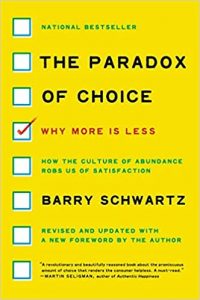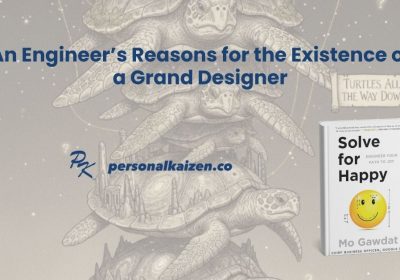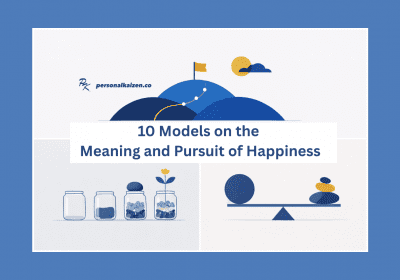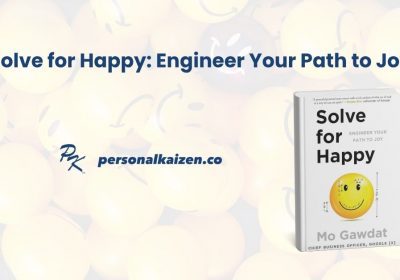The 2004 book, The Paradox of Choice: Why More is Less by Barry Schwartz was recently recommended. The book references studies from behavioral economics and psychology on choice and happiness. It concludes that adopting a life attitude of “good enough” is going to result in better mental health than always striving to make the best choice.
Schwartz explains that while we may have more options today than ever before, we are more likely to second guess a decision, worry if we made the best choice, or even avoid making any decision (paralysis by analysis). Schwartz believes “satisficers” who pick what is good enough for them are more likely to remain happier than “maximizers” who strive to make the optimal choice every time.
The final section of the book is focused on what to do about choice. Here are the key recommendations from the end of the book that you can apply to live a happier life.
1. Choose When to Choose
Determine which choices in your life matter and which don’t. If the process of choice makes you feel worse about what you’ve chosen, then you haven’t gained anything. Try setting up some simple rules to live by. For example:
- I’ll shop online for 10-minutes and then buy my favorite option
- Two glasses of wine are all I’ll drink tonight
- I’ll buy my favorite choice from these two shops in the mall
2. Be a Chooser, Not a Picker
Choosers have time to reflect on a decision and can choose to delay a selection. Pickers are passive selectors forced to choose from one of the available options. When you choose to choose it is wise to take the time to get it right instead of just selecting from what is available.
3. Satisfice More and Maximize Less

Maximizers are more likely to have expectations that can’t be met, regret their choices, make social comparisons, and be disappointed. Learning to accept “good enough” will simplify decision-making and increase satisfaction. Instead of agonizing over a decision, Schwartz recommends you:
- Remember times when you settle for “good enough,”
- Scrutinize how you choose in those areas, and
- Apply that strategy more broadly
4. Think About the Opportunity Costs of Opportunity Costs
In The Paradox of Choice, Schwartz has several suggestions to help you simplify decisions (and benefit from the time you gained from not having to choose):
- Unless you are truly dissatisfied, stick with what you always buy
- Don’t be tempted by “new and improved”
- Don’t “scratch” unless there is an “itch”
- And don’t worry about missing out on new things by following these rules
5. Make Your Decisions Nonreversible
The very option of being allowed to change our minds increases the option that we will. It is often better to commit to your decisions (especially large ones like marriage) so you don’t have to stress about them.
6. Practice an “Attitude of Gratitude”
Instead of focusing on where you made a bad decision, spend more time being grateful and thankful for all the good decisions you have made.
7. Regret Less
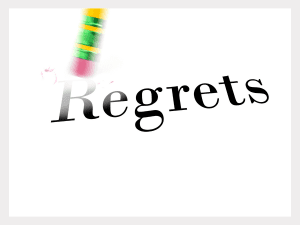
We will regret less when we:
- Adopt the standards of a satisficer rather than a maximizer
- Reduce the number of options before making a decision
- Practice gratitude for what is good about a decision rather than focusing on the bad features
8. Anticipate Adaptation
When you get something new, the excitement and thrill you have at first will soon wear off. Anticipate that this adaptation is natural and expected. This change in feeling doesn’t mean that the original decision was bad.
9. Control Expectations
One of the easiest ways to reduce future disappointment about a decision is to reduce your up-front expectations. Be satisficed with a “good enough” choice. Schwartz also suggests allowing for serendipity – planning less and seeing what chance happenings develop.
10. Curtail Social Comparison

“Keeping up with the Joneses” was a problem when Schwartz released his book in 2004, and Facebook, Instagram, and other social media options have only made things much worse. Comparing yourself to others is going to make you more of a maximizer – always second-guessing your choices. Instead, Schwartz suggests you “focus on what makes you happy, and what gives meaning to your life.”
11. Learn to Love Constraints
As the number of choices we face increases, freedom of choice eventually becomes tyranny of choice. Making and following rules (for example, always wear a seat belt, and never cheat on a partner) frees up time and attention for decisions in our life to which rules don’t apply. It is smarter to decide once on living by some basic rules and constraints to free up time and reduce the chance for regret later.
We hope you enjoyed this summary of The Paradox of Choice: Why More is Less. Please leave comments and questions below!

